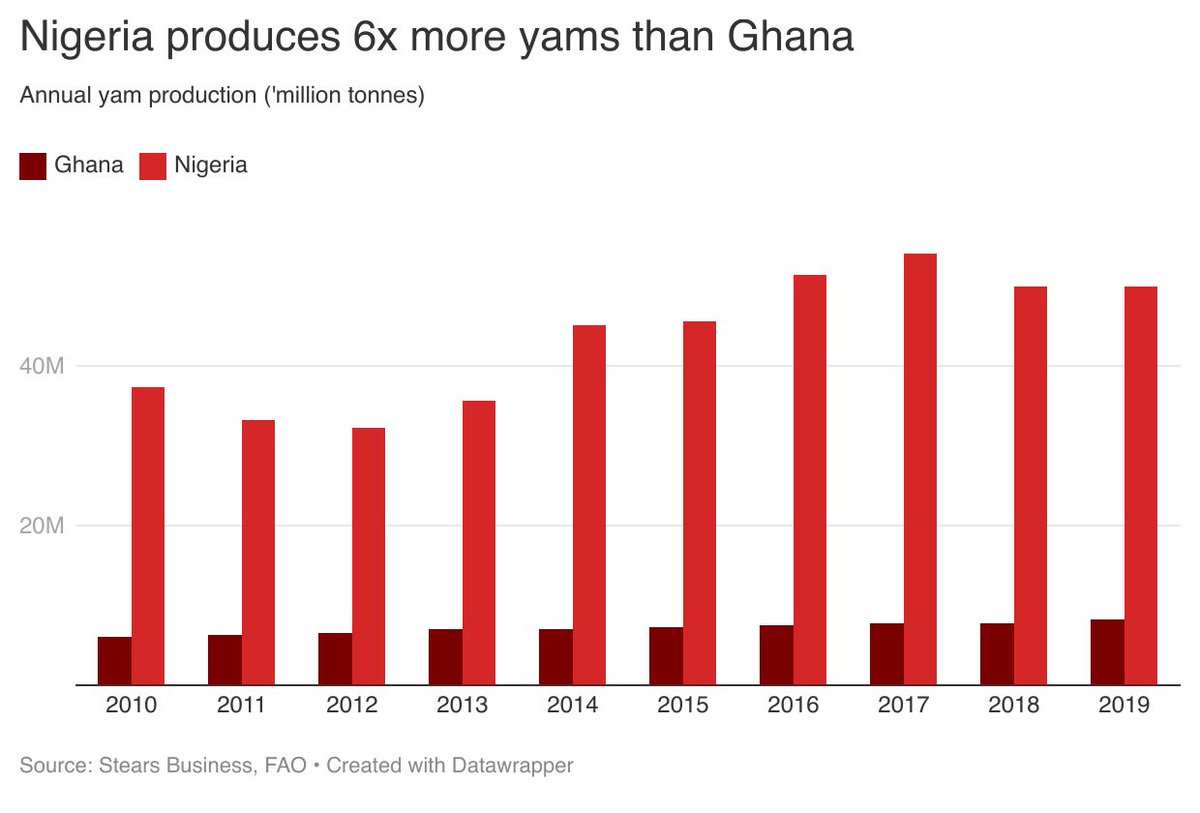 is responsible for 67% of global yam production and produces six times more yams than Ghana. Yet, Ghana contributed 94% of the total yams exported from West Africa and 22% of global exports in 2019.
is responsible for 67% of global yam production and produces six times more yams than Ghana. Yet, Ghana contributed 94% of the total yams exported from West Africa and 22% of global exports in 2019.Why does
 lag behind Ghana when it comes to yam exports?
lag behind Ghana when it comes to yam exports? THREAD
1/ 14
First of all, let’s dismiss the self-sufficiency argument. Yes, one of the reasons why we produce food is for self-sufficiency. It is one of Nigeria's strategies to ensure food security.
2/14
2/14
Our annual per capita consumption of yam is 120kg and with Nigeria’s population at approximately 190 million people, Nigeria will need only about 22.8 million tonnes of yam to meet local demand.
Nigeria produces about 40-50 million metric tonnes every year.
3/14
Nigeria produces about 40-50 million metric tonnes every year.
3/14
Despite Nigeria’s high consumption and large population, Nigeria still has more than enough to meet global yam demand—which is barely 0.2% of total production.
4/14
4/14
One possible reason Nigeria fails to take advantage of this opportunity could be because of an outdated law.
5/14
5/14
In February 1989, the government passed the Export Prohibition Act of 1989 which prohibits cassava, yam, rice, maize, and beans from being exported out of Nigeria. Any person who attempts to take them out of Nigeria may face life imprisonment.
6/14
6/14
Lawmakers introduced a bill to repeal the entire Act in 2004, it just passed the second reading in 2019. While the act is yet to be repealed, there have been several avenues to export yams.
7/14
7/14
Another reason Nigeria’s contribution to yam exports is so low is due to issues with storage and challenges at the port. This only increases the likelihood of yams arriving at the destination already rotten.
8/14
8/14
Storage is critical when selling yams because yams can only be stored for six months in well-ventilated barns, to maintain their quality. By the time these yams are three months old, 10-15% begin to rot, and by six months, 30-50% can get wasted.
9/14
9/14
Then comes the next hurdle: transporting them to the port.
10/14
10/14
Sometimes it takes as long as a month to move your export from the market to the port where the yams wait for inspection by the Customs service and the Nigerian Agricultural Quarantine Service (NAQS).
11/14
11/14
Unlike Nigeria, in Ghana, the yams are packaged and stored in the same place where they are verified for exportation which saves transportation time and cost. Little surprise as to why yams are exported much faster than in Nigeria.
12/14
12/14
Michael Adedipe, the MD of a food retailer in the UK, explained that although his yam imports from Ghana were not perfect, they got delivered in two weeks, compared to Nigeria's consignment that came in three months.
13/14
13/14
In order to give Ghana a run for its money in terms of yam exports, we must first tie up the legal loose ends and fix our storage problem.
Read more about what Nigeria can learn from Ghana.
14/14 https://www.stearsng.com/premium/article/how-ghana-came-to-dominate-yam-exports
Read more about what Nigeria can learn from Ghana.
14/14 https://www.stearsng.com/premium/article/how-ghana-came-to-dominate-yam-exports

 Read on Twitter
Read on Twitter


